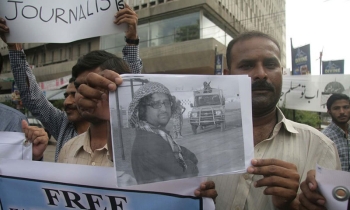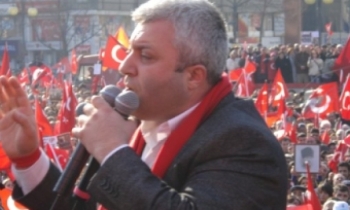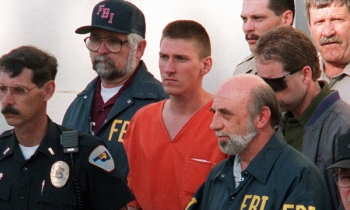LOS ANGELES -- An explosive article in January's Vanity Fair details the sundry adventures of Judith Miller and the New York Times surrounding the controversial reporter’s decision to be jailed for refusing to identify her source to a grand jury investigating the case of who outed covert CIA agent Valerie Plame. The magazine is out on newsstands in Los Angeles.
The story, by Seth Mnookin, splashes the back pages of the magazine, and begins with a full-page photo of a grave, lipsticked Miller on one side and the dark empty doors of the Times' 43rd street offices on the other. The teaser: "Seth Mnookin details Miller's stonewalling of colleagues, the newsroom's belief that it had a loose cannon in its midst, and the growing questions about [New York Times' Publisher Arthur] Sulzberger's judgment."
Mnookin paints a dark reportorial landscape where reporters from the Times were barred from speaking with top executives, or weren't allowed to speak with members of their own editorial board.
"Publisher Arthur Sulzberger barred reporters from speaking with Russell Lewis, the former president and CEO of the Times Company," Mnookin wrote, "saying, 'Because I don't know what the fuck he's going to tell you.'"
Miller, Mnookin writes, was an ebullient, indefatigable reporter who threaded the borders of acceptable journalistic practice.
"She dated Steve Ratner, one of Sulzberger's best friends... and had even, for a time, shared a vacation home with Sulzberger. She had a reputation for sleeping with her sources (in the 1980s, she both lived with then congressman Les Aspin and quoted him in her dispatches); ... for raining torrents of abuse on clerks, travel agents, and drivers; for cutting down her colleagues."
Aspin, a Democrat, supported Reagan's moves with the Iran Contras and was lauded as a "military expert" for predicting the first Gulf War could be won with light casualties. He was Secretary of Defense under President Bill Clinton.
Until literally hours before her story was to go to print, Miller's cooperation with the Times reporters who were charged with telling her story was minimal. She initially refused to speak to reporter Adam Liptak because she felt an earlier story he penned about her release from jail had implied that she had gotten a sour deal. She wouldn't speak to Janny Scott because, "Scott had not bothered to write to her when she was in jail." Her relations with a third reporter covering her case were frosty too -- when Miller gave Don Van Natta a hug, saying she was glad he was covering her story, she said: "I can't do it now. I'm running off to go meet with Barbara Walters." Miller later complained to executive editor Bill Keller about how Van Natta was questioning her for his story.
Mnookin also includes curious details about the publication of his own Vanity Fair expose.
"After I approached [Miller] for this story, she complained to the editor of this magazine and raised questions about my allegiances. She also wrote to me in an email, 'Seth, I read what you wrote about me in your book. You never bothered to check any of your alleged facts about me. I have absolutely no intention of talking to you.' Later, Miller asked to be involved, and Mnookin says he sent her questions, twice. She never responded."
Ultimately, Mnookin ascribes the Miller saga to a climate where Sulzberger, the Times publisher, and Miller, a longtime friend, were dead-set on restoring their reputations after the fall from grace of the Times' previous editor, Howell Raines. Raines resigned along with his managing editor after the paper revealed that reporter Jayson Blair had fabricated and plagiarized myriad stories.
"Post Howell, Arthur and Judy were both looking at resurrecting their reputations. And Arthur was so oblivious he didn't care about the repercussions," one Times reporter told Mnookin. Said another business-side employee of the paper: "Arthur's very well-intentioned. But there's something approaching panic about the way he deals with things. There have been a lot of very messy problems in not a lot of years. We could all see this was not the right fight to pick. But he was so determined to push ahead."









